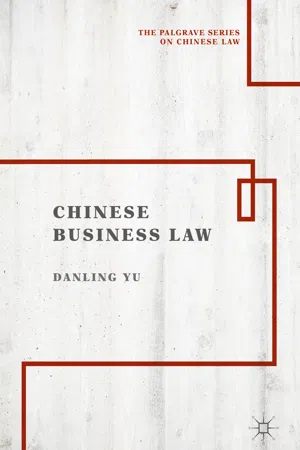Business
Issuance of securities
"Issuance of securities" refers to the process of a company offering and selling financial instruments, such as stocks or bonds, to investors. This is a way for businesses to raise capital for various purposes, such as funding expansion or paying off debt. The issuance of securities is regulated by government authorities to ensure transparency and protect investors.
Written by Perlego with AI-assistance
Related key terms
Related key terms
1 of 4
Related key terms
1 of 3
3 Key excerpts on "Issuance of securities"
- eBook - ePub
- Alastair Hudson(Author)
- 2017(Publication Date)
- Routledge(Publisher)
Therefore, this chapter will not consider private companies until the very end, because the principal focus of securities law is on issues of securities to the public at large by public limited companies. First, however, we shall consider what is meant by a ‘security’ by examining the use of bonds and shares in raising money from investors. (For a more detailed discussion of these regulations you should refer to Alastair Hudson, Securities Law, 2013a generally, or Alastair Hudson, The Law of Finance, 2013b.) The mechanics of securities markets in raising capital for companies There are two ways in which a company can raise money: it can borrow it or it can issue shares. Borrowing money can be done by means of an ordinary loan or it can be done by issuing bonds. Bonds are a form of security that can be bought and sold like shares. In a bond issue, the company issues a large number of bonds of equal value and carrying equal rights; investors buy those bonds by paying the purchase price of the bond to the issuing company. The company is then obliged to pay interest periodically to the investors and is obliged to repay the purchase price of the bond at the end of the life of the bond. As a result, the company acquires a loan provided collectively by all of the investors, it pays interest (just like an ordinary loan) and it is required to repay the loan at the end of the contractual term (just like an ordinary loan). Significantly, the investors acquire securities in the form of the bonds: the important part about a security is that it can be sold. Therefore, the investors may be speculating on the movements in the value of the bonds on the open market, instead of simply waiting to receive interest on their ‘loan’ to the company. Usually there is a ‘trustee’ appointed over the bond issue to ensure that payment is made and to activate the default provisions in the documentation if the issuing company breaches any of its obligations - eBook - ePub
- Danling Yu(Author)
- 2018(Publication Date)
- Palgrave Macmillan(Publisher)
The issuance must be approved by the approval authority (CSRC) or examined and approved by any other authorized agency under the State Council. Any unapproved issuance is void and illegal. The Securities Law sets forth conditions for securities issuance which vary between stocks, bonds, and other types of securities. 3.11.2 Stocks Under the current legal regime, only joint stock limited liability corporations may issue stocks. General conditions apply to stock issuance upon establishment, for corporate restructuring, and new issuance. 3.11.2.1 Conditions for Stock Issuance Upon Establishment A stock issuance upon establishment (sheli faxing gupiao, 设立发行股票) is generally referred to as an initial public offering (IPO). The corporation in question seeks to raise financing during an IPO and thereby establish itself as a joint stock limited liability corporation - eBook - ePub
Financial Theory: Perspectives From China
Perspectives from China
- Xingyun Peng(Author)
- 2015(Publication Date)
- WCPC(Publisher)
More often than not, when an investment manager has a bearish outlook, it will lead to a strong bond investment ratio. When the market is relatively bullish, the fund will increase its investment in stocks. In theory, these funds should perform much better than growth funds during a stock market crash. On the other end, these funds will not perform as effectively as growth funds in a bull market. 9.3 Issuance and Trading of Long-Term Capital Market Instruments 9.3.1 Issuance of Long-Term Capital Market Instruments: Stocks and Bonds If an enterprise wants to raise medium and long-term capital on stock or bond markets, they will need to issue stocks or medium- and long-term bonds. Enterprises primarily issue stocks through initial public offerings (IPOs) and seasoned equity offerings. Seasoned equity offerings, thus, are stock issuance by listed companies to raise capital. The issuance of long-term capital market instruments are organized by underwriters. In China, underwriting is carried out by securities companies providing investment banking services. Not all securities companies can carry out investment banking; only all-license securities companies can engage in securities underwriting. Based on the different degrees of delegation and underwriters’responsibilities, underwriting can be divided into traditional underwriting, standby underwriting, and distribution. Traditional underwriting is the most common form of underwriting for capital market issuance. The underwriters accept the issuer’s full authorization, and bear the responsibility of selling all the financial instruments to the investors. Generally, underwriters buy all the issued stocks or bonds from the issuer in their name, and then sell them to the general public
Index pages curate the most relevant extracts from our library of academic textbooks. They’ve been created using an in-house natural language model (NLM), each adding context and meaning to key research topics.
Explore more topic indexes
Explore more topic indexes
1 of 6
Explore more topic indexes
1 of 4


